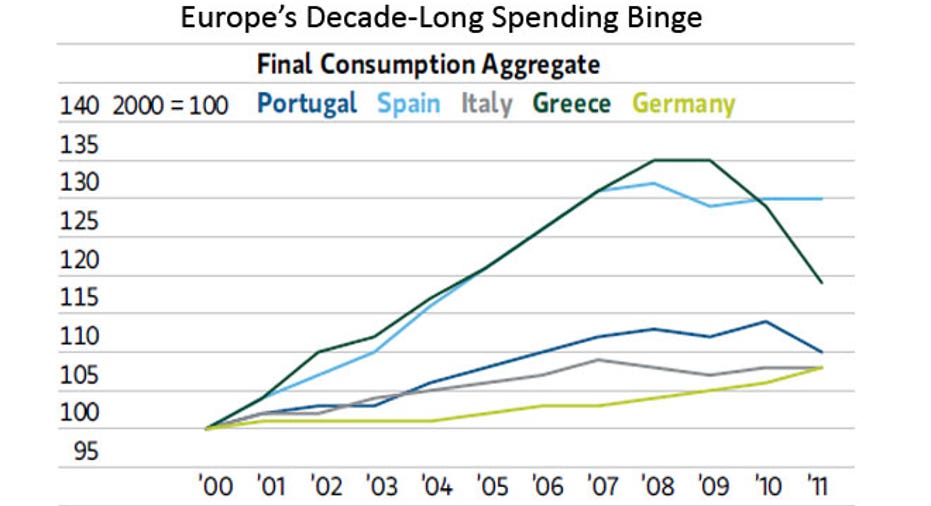Embattled Euro: A Work in Progress, or Doomed for Failure?

As the financial world holds its breath ahead of Greece’s pivotal elections this weekend, some believe it’s time to write the obituary on the grand monetary experiment known as the euro.
Can you blame them? After all, the scary financial crisis is threatening the eurozone’s very existence, forcing companies and policymakers to discuss the once unthinkable exit of one or more countries.
“Yes, the euro is a failure because it lacks the institutional structure to deal with a major crisis should one arise,” said Jack Goldstone, a senior fellow at George Mason University. He said the eurozone is “sort of like a beautiful sailboat that runs fine in smooth wind, but has no motor if you are becalmed and approaching a reef.”
Even Alan Greenspan, the former chairman of the Federal Reserve, is publicly questioning the sustainability of the euro.
In a speech this week in Montreal, Greenspan said Europe’s “noble experiment” for a monetary union has been a “failure,” pointing to the incorrect presumption that Greeks would behave economically like Germans simply because they share a currency.
"A currency union is a long-shot without a fiscal union."
All eyes will be on Greek elections this weekend that could decide whether the debt-ridden country opts to leave the eurozone, setting a potentially dangerous precedent for other weak euro nations.
Economists at Morgan Stanley (NYSE:MS) believe there is a 35% chance of a eurozone breakup during the next 12 to 18 months, a scary prospect considering the currency union debuted just over a decade ago.
“A decade isn’t very long in human history,” said Richard Sylla, an economist and financial historian at NYU who said the euro can be classified as “kind of a failure.”
The eurozone was designed as part of a long-standing political ambition to integrate Europe in an effort to prevent a recurrence of the wars that plagued the continent for the better part of the previous 500 years.
“By the time Europe got to the 20th century, they were just exhausted and sick of it. It almost destroyed their entire civilization,” said James Rickards, author of Currency Wars: The Making of the Next Global Crisis.
Fiscal Differences Come Home to Roost
The creation of the euro was also aimed at generating a single monetary policy, lowering transaction costs, keeping inflation comfortably low and avoiding competitive currency devaluations.
Instead of taking the next step of a fiscal union where taxing and spending policies would fall under central control, eurozone creators substituted little-enforced rules on the size of member countries’ debt and deficits.
“It is a failure because it was not followed by the necessary fiscal union. A currency union is a long-shot without a fiscal union,” Cam Harvey, a finance professor at Duke University, said in an email.
These rules, spelled out in the Maatricht Treaty, were badly broken -- even by fiscally-conservative Germany.
“They didn’t live up to their own rules fiscally and it has now come back to haunt them,” said Sylla.
Even if the rules were followed, Harvey said most of the benefits of integration came through the “harmonization of regulations via” the European Union -- not from the creation of the euro.
At the same time, the creation of the euro caused borrowing costs to plunge to German levels even in higher-risk eurozone nations.
Greece and Portugal took advantage of their tumbling bond yields by racking up huge amounts of debt that eventually triggered a pair of bailouts. The low interest rates helped fuel housing bubbles in Ireland and Spain, the latter of which received a $125 billion bailout last week for its crumbling banking sector.
Could Political Will Trump Economics?
Some believe investors bracing for a eurozone breakup are thoroughly underestimating the political stomach in Europe to make the experiment work despite the daunting economic costs.
“The problem with Greenspan and all economists is they’re using very traditional metrics, most of which don’t work and none of which take into account politics, history and political will,” said Rickards, senior managing director at New York-based Tangent Capital. “I favor free markets, but it’s naive not to understand how politics can trump markets every time.”
Earlier this week Treasury Secretary Tim Geithner emphasized the political will of Europe’s leaders to avoid a collapse of the euro.
“What they say to us privately is they will do whatever is necessary to hold it together,” Geithner said in a talk at the Council on Foreign Relations. “They made the choice, that fateful choice, that they're going to do what it takes to make Europe work.”
That political will is likely to be tested in the coming weeks and months as Europe decides on either allowing a member like Greece to exit or moving instead toward a greater fiscal union.
Rickards compared the situation with taking a cake out of the oven after just 30 minutes. “You don’t say it’s a failure. You let it keep baking until it’s finished,” he said.
Leadership Void Looms
Increasingly, Europe has been reading up on its American history, focusing on the ability of Alexander Hamilton to settle fiscal issues in the U.S. before introducing the dollar.
Yet Europe’s indecisive and slow-footed response to the crisis underscores a leadership vacuum on the continent that threatens to swallow the euro.
German Chancellor Angela Merkel clearly has the most power, but Merkel has been reluctant to open her country’s purse strings as she negotiates with a revolving door of new prime ministers.
“They don’t seem to have a leader who can crack the whip and say this is what we should do in everybody’s interest,” said Sylla. “There’s no Hamilton in Europe right now."



















